I. Introduction
In China, which is a socialist country under one-party rule by the Chinese Communist Party (CCP), private enterprises are at a disadvantage when competing with state-owned enterprises. In recent years, with the tightening of regulations by the government and the inception of economic recession, the performance of private enterprises has deteriorated sharply. To promote the healthy development of private enterprises, the Chinese leadership has tried to redress discrimination based on differences in ownership systems by removing barriers to market entry and strengthening the protection of private property rights. As part of these efforts, “Opinions of the Party Central and State Council on Promoting the Development and Growth of the Private Economy,” which contain comprehensive reform measures, were released on July 19, 2023. However, the road ahead will be a long one, hindered by traditional ideology and resistance from vested interests.
II. Stalling Private Economy
In China, with the shift to reform and opening-up at the end of the 1970s, private enterprises that started from scratch, and by extension the private economy composed of them, rode the wave of marketization and have surpassed state-owned enterprises in terms of total revenues and employment in the industrial sector (Figure 1).
- Private vs. State-owned Enterprises
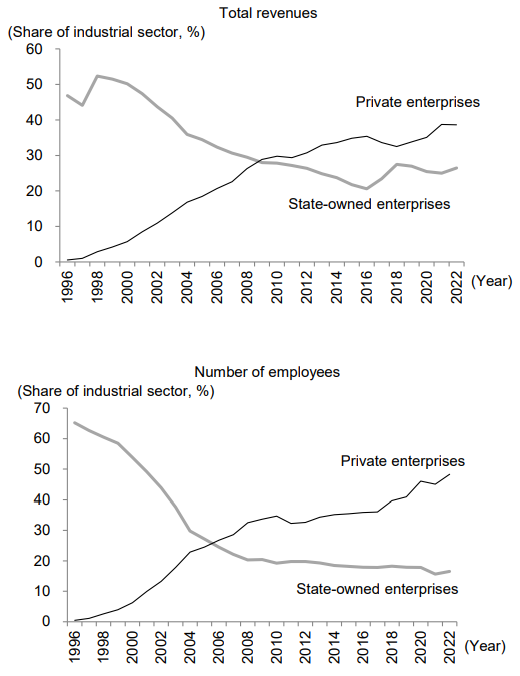
2. The number of employees is the annual average.
Source: Compiled by the author from the CEIC database (original data from the National Bureau of Statistics).
In recent years, however, private enterprises have been experiencing a notable downturn against a backdrop of stricter government regulations and economic recession. Particularly since 2021, the phenomenon of "national advance and retreat" has become more pronounced in the real estate industry, with many private enterprises suffering from a debt crisis. The number of private enterprises ranked in “China's Top 100 Real Estate Developers” in 2022 decreased from 46 to 30 and their share of sales from 32.0% to 25.0%, while the number of state-owned enterprises (including mixed ownership enterprises) increased from 54 to 70 and their share of sales from 68.0% to 75.0%. Reflecting the significant drop in housing investment by private real estate developers, fixed asset investment by private enterprises in January-July 2023 was below the previous year's level (Figure 2). In the industrial sector, there has been a reversal between state-owned and private enterprises in terms of the growth rate of value added and profits (Figure 3). Furthermore, while the market capitalization of China's leading platform companies Tencent and Alibaba at one point approached that of U.S. big tech companies, it has declined significantly in the wake of tighter government regulation (Figure 4) (Note 1).
- Private vs. State-owned Enterprises
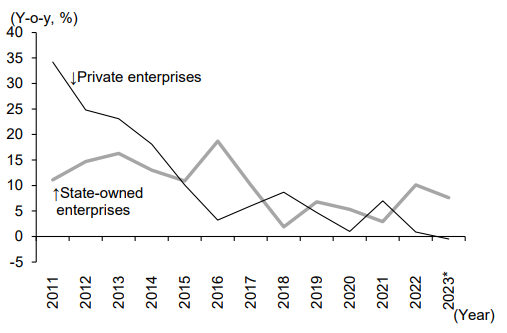
2. 2023 figures are the cumulative totals for January-July.
Source: Compiled by the author from the National Bureau of Statistics of China.
- Private vs. State-owned Enterprises
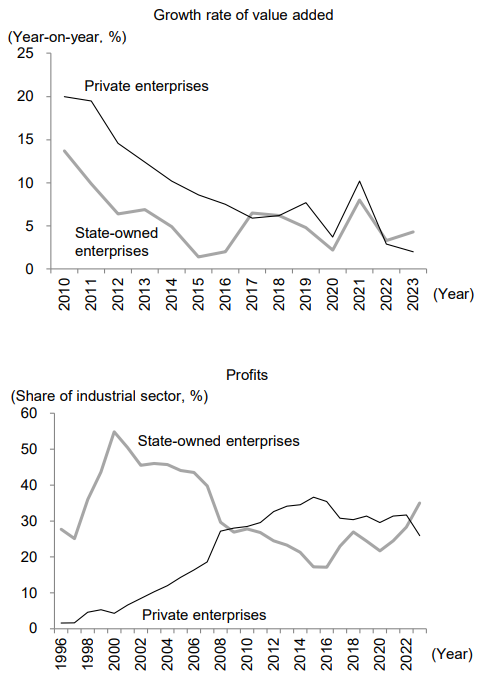
2. 2023 figures are the cumulative totals for January-July.
Source: Compiled by the author from the CEIC database (original data from the National Bureau of Statistics).
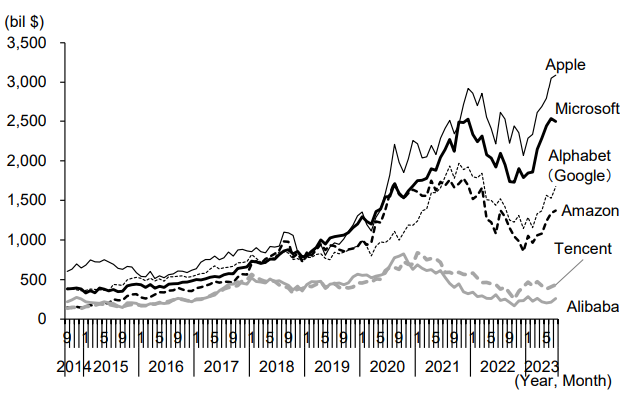
Source: Prepared by the author from Bloomberg.
III. Private Enterprises at a Disadvantage under the Socialist Regime
In addition to the slowdown in economic growth and tighter government regulation, the traditional ideology of socialism has also constrained the development of private enterprises.
By nature, private enterprise is predicated on capitalism and private ownership, and therefore at odds with socialism (or communism). As Marx and Engels wrote in the Communist Manifesto, "(T)he theory of the Communists may be summed up in the single sentence: Abolition of private property. " This is also the "original intention" of the CCP which was founded in 1921.
In China, following the Communist revolution of 1949, a planned economy was put in place, centered on publicly-owned enterprises consisting of state-owned enterprises and collectively-owned enterprises, and the private enterprises that had existed until then were "converted" to publicly-owned enterprises. After the reform and opening-up led by Deng Xiaoping in the late 1970s, the right of private enterprises to exist was once again recognized. This was justified by the theory of "primary stage of socialism" proposed by General Secretary Zhao Ziyang in the 1980s. This theory argues that since Chinese socialism was born out of a semi-colonial, semi-feudal society, and the level of its productive forces is far behind that of advanced capitalist countries, during the primary stage of socialism, which may last for a long time, China needs to make use of capitalist elements such as private ownership and private enterprise to achieve the industrialization that many other countries have accomplished under capitalist conditions.
This stance of the CCP has not changed. In fact, General Secretary Xi Jinping recognized at the 20th National Congress of the Chinese Communist Party in October 2022 that China is still in the primary stage of socialism. However, there is no clear policy on how private ownership and private enterprises will be treated in the future when China reaches a higher stage of socialism, following the rise of the productive forces, and this remains a concern for private entrepreneurs.
State-owned enterprises, and by extension the state-owned economy that they form, support the Communist regime not only in ideological terms, but also in the following aspects. First, state-owned enterprises are positioned as the backbone of the Chinese economy and monopolize important industries (e.g., energy, mining, telecommunications, transportation, and finance). In addition, state-owned enterprises provide large numbers of jobs and contribute to social stabilization. Furthermore, state-owned enterprises are important players in implementing government policies, such as economic stimulus measures. And managers of state-owned enterprises are usually high-level Communist Party officials, and their loyalty to the Party and the government is supposed to be stronger than that of managers of private enterprises (Note 2).
In contrast to the emphasis on state-owned enterprises, the Communist Party is wary of the huge, domestic private enterprises as a potential threat. Therefore, they are trying to strengthen control over them through capital participation, establishment of party organizations, etc., along with tightening regulations. However, political interference in business could sap the vitality of private enterprise.
Due to differences in ownership systems, private enterprises face high barriers to entry, as well as various forms of discrimination. First, state-owned enterprises receive fiscal and financial support from the government, including deficit compensation, while private enterprises do not benefit from this support. In addition, state-owned enterprises have access to land, funds, and other factors of production at a lower cost, whereas private enterprises must bear higher costs.
In terms of legislation and the enforcement of law and regulations, the phenomenon of prioritizing state-owned enterprises over private enterprises still exists. Specifically, private enterprises face institutional or invisible obstacles to market entry and management activities because their property rights and interests are not effectively protected. In particular, the phenomenon of in-coming officials reversing the promises of their predecessors is common, and this has contributed to a decline in the willingness of private enterprises to invest. There are also frequent cases of prosecutors and judicial institutions abusing their judicial power, violating judicial procedures without sufficient evidence or legal grounds, and seizing the assets of private entrepreneurs after arresting them on "baseless" charges (Note 3).
IV. Support for Private Enterprises as a Priority Issue
As the reform and opening-up initiative progresses, the Chinese leadership has come to recognize the importance of private enterprises in economic development and are attempting to support them while also tightening control over them. At the 20th National Congress of the Chinese Communist Party in October 2022, a policy was presented which stipulated "optimizing the development environment for private enterprises, protecting the property rights of private enterprises and the rights and interests of entrepreneurs in accordance with the law, and promoting the development and strengthening of the private economy.” The "Opinions of the Party Central and State Council on Promoting the Development and Growth of the Private Economy," which contain specific policies for this purpose, were released on July 19, 2023.
The "Opinions" present the following six key tasks (Table 1).
- (1) Continuously optimize the development environment for the private economy based on the removal of market entry barriers.
- (2)Strengthen policy support for the private economy, focusing on the development of financing support policies and programs.
- (3)Strengthen the rule-of-law guarantee for the development of the private economy, focusing on strengthening the protection of property rights of private enterprises and the rights and interests of entrepreneurs.
- (4)Strive to promote high-quality development of the private economy through encouragement of research and development, etc.
- (5)Promote the healthy growth of private entrepreneurs through the development of a close and clean government-business relationship, among other measures.
- (6)Continuously foster a social atmosphere that cares for and promotes the development and growth of the private economy by, for example, inducing society to properly recognize the significant contribution and important role of the private economy.
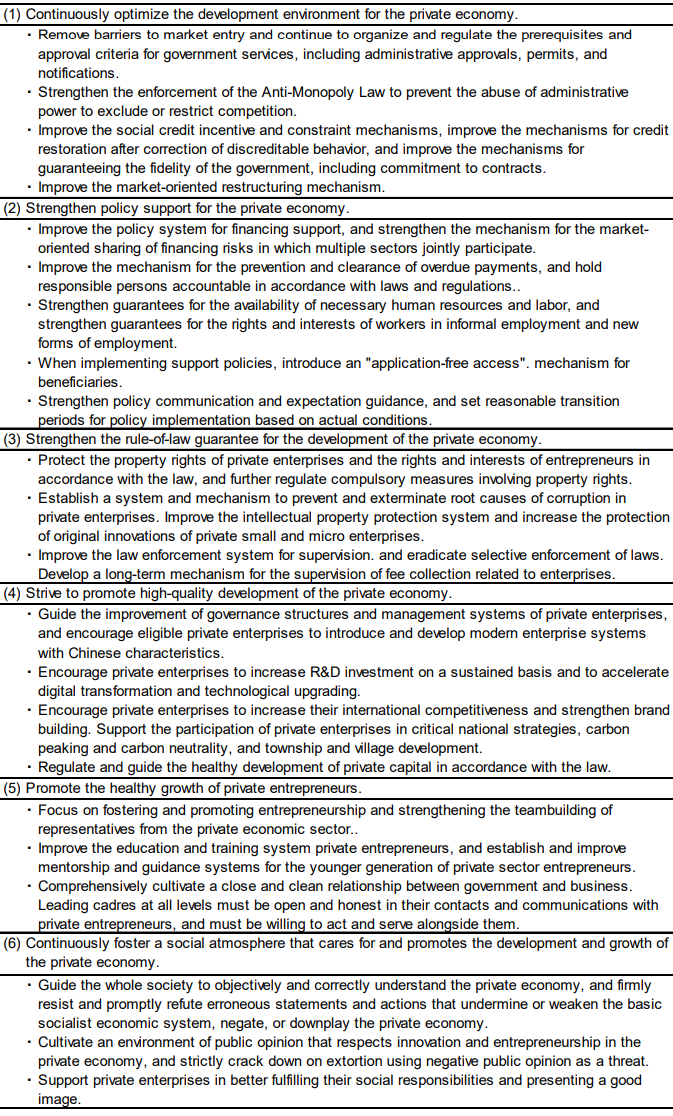
V. Removing Key Market Entry Barriers and Strengthening Protection of Private Property Rights
Among the proposals in the "Opinions," the most important are (1) the removal of barriers to market entry and (3) the strengthening of protection of private property rights, including property rights of private enterprises and the rights and interests of entrepreneurs.
First, there are many barriers to market entry which prevent private firms from expanding into some industries and regions.
The Chinese government has implemented a market entry negative list system to facilitate entry into industries monopolized by state-owned enterprises. The Negative Market Entry List enumerates prohibited and permitted entry items. For items not included in the negative list for market entry, private enterprises may enter the market on an equal basis, in accordance with the law.
The implementation of the negative list system for market entry has greatly improved the transparency of the entry system in China, but many barriers to entry still remain. First, the entry criteria and screening process are opaque. Even in industries that are supposed to be open to entry even if they follow the rules and pass administrative screening, in reality, many unreasonable conditions are added. Despite the change from an approval-based to a registration-based system for obtaining business licenses in some industries, in effect, the same approval process must still be followed. In addition, there are many restrictions related to government procurement and bidding that discriminate against private enterprises. For example, in some industries, companies are ranked according to size, assets, number of employees, experience, etc., and small and micro private enterprises that are just starting out are ranked so low that they cannot actually participate in government procurement or bidding. In the future, barriers to market entry must be further reduced, with a focus on improving the negative list system for market entry.
In addition to restrictions on industrial sectors, private enterprises face the barrier of local protectionism when entering the market. Local protectionism means policies by which local governments favor local businesses to protect their own economic interests to the detriment of businesses from other regions. Specific examples are policies that favor local firms or that put technical standards and requirements in place to prevent firms in other regions from entering the market. These measures that hinder fair competition must be corrected.
Second, private firms are hesitant to expand their business through investments and other means, primarily because entrepreneurs are concerned about the security of their property. Companies are less willing to invest funds in R&D, especially when intellectual property rights are not adequately protected. In some cases, company profits are not reinvested and are transferred overseas. In order to effectively protect the property rights of private enterprises and the rights and interests of entrepreneurs, the principle of equality must be upheld not only in the enactment of laws, but also in their enforcement.
Based on this recognition, the Chinese leadership is working to redress discrimination based on differences in ownership systems, focusing on removing barriers to market entry and strengthening protection of private property rights for the healthy development of private enterprises. However, hindered by traditional ideology and resistance from vested interests, the road to realization of the goal will still be a long one.
The original text in Japanese was posted on September 13, 2023.


